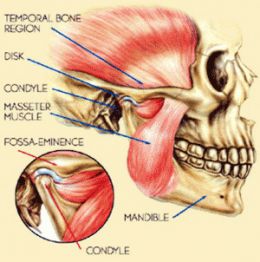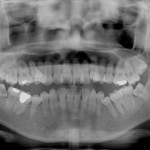By Arthur Kezian
If you’re dealing with things like headaches and earaches, you may not be sick. Instead, the problem may lie in your TMJ – or, your Temporomandibular Joint. In fact, there are thousands of people just like you, who are suffering from jaw pain and are desperate for relief!
What is a TMJ?
Hold your hand up to the side of your face, right in front of your ear. You’ll feel a “hinge” that connects the side of your skull to your lower jaw. That’s your TMJ. Every time you open your mouth, chew your food, yawn, or talk, your TMJ is hard at work.
 Unfortunately, though, if you grind your teeth, injure your jaw, chew too much gum, or even experience too much stress, the small cartilage disc inside your TMJ can get knocked out of place. When that happens, it puts pressure on all of the nearby nerves. Whenever you move your jaw, the disc moves around, causing your jaw to make a clicking or popping sound.
Unfortunately, though, if you grind your teeth, injure your jaw, chew too much gum, or even experience too much stress, the small cartilage disc inside your TMJ can get knocked out of place. When that happens, it puts pressure on all of the nearby nerves. Whenever you move your jaw, the disc moves around, causing your jaw to make a clicking or popping sound.
 TMJ pain is incredibly uncomfortable. When you suffer from it, even the most simple of things – like eating food or yawning – can be excruciating. You may wind up with muscle spasms, headaches, cheek pain, and ear pain. In fact, lots of people mistakenly think they have an ear infection, when they’re really suffering from TMJ pain!
TMJ pain is incredibly uncomfortable. When you suffer from it, even the most simple of things – like eating food or yawning – can be excruciating. You may wind up with muscle spasms, headaches, cheek pain, and ear pain. In fact, lots of people mistakenly think they have an ear infection, when they’re really suffering from TMJ pain!
So, how do you deal with it?
Unfortunately, you can’t do it on your own – and you can’t ignore it. After all, every time you open and close your mouth, you’re doing more damage! You’ll need a specialized TMJ dentist to figure out exactly what’s causing your pain.
A good TMJ dentist will give you a physical exam. He’ll check your bite alignment to make sure it’s not unusual. He’ll also take some x-rays to see if you have a structural problem.
Once your TMJ dentist knows what’s causing the pain, he can fix it. For example, poor bite alignment can be resolved with things like mouth guards or even braces. If your problem is due to some kind of injury or trauma, your dentist can show you how to stretch and massage the area to get some relief.
What if the problem is more serious?
If your TMJ pain is severe, your dentist can prescribe painkillers or muscle relaxants that give you some relief. These are only temporary solutions, though.
In some cases, TMJ pain can be resolved with laser therapy. Your dentist can use a special laser to soften the cartilage disc, so that it can move back into the proper place. Or, if you’re dealing with serious inflammation, your dentist may give you a corticosteroid shot.
No matter what’s causing your pain, a qualified dentist can help you get rid of it!
Dr. Arthur A. Kezian DDS 443 N. Larchmont Blvd Los Angeles, CA 90004 (323) 467-2777
